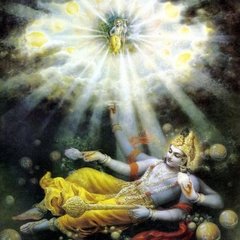Search the Community
Showing results for tags 'thought'.
Found 5 results
-
"The rising of thought (the rising of the first thought, ‘I am so-and-so’) itself is birth, and the forgetfulness of Self itself is death. The mind’s phenomena of such thinking and forgetting is called samsara. When the mind, freed from its impure state of thinking and forgetting, stands ever holding on to Self, that is called the destruction of the mind [manonasa], which itself is liberation." ~Sri Muruganar
-
Very succinct. This may help... ADVICE FOR BEING IN SELF-ABIDANCE Be quiet. See the mind as it is. Grace action starts. Then Peace occupies your Heart. Then be still. The Grace of Self burns all your tendencies. No question or any practice is needed. You already reached the destination. That is the Source of thought. If you lose your Awareness, immediately sleep, deep sleep or thought will come. Stop just for a few seconds, see the covering, and immediately Awareness will come. Then if you question, 'To Whom?', and wait, the question and thought will vanish. Again we will get Peace. Then be quiet and still. While you are in Peace, see the experiencer of that Peace or question, 'Who is that experiencer?'. The experiencer will disappear. But it rises again and again. As and when it rises, see it with Peace and Awareness or question, 'Who Am I?', until it burns. When the seer or the experiencer or the questioner burns permanently - that is Jeevanmukti (Self Realization). V. V. Brahmam
-
Lately, I discovered that my meditation was actually hacked by a mind function that conceptualizes and creates an image of an experience and faked my experience of reality. an example: the experience or state of no-thoughts, at first it was a genuine experience and it felt really nice, during meditation. but after a while i discovered that, during my practices in the past months, I wasn't actually in that state that I started with and i was actually in a thought of no-thoughts. In other words, I was living in a conceptualized image of what i experienced first time i started the practice and the mind automated the process by attracting my awareness into it. which got me question a lot of my experiences, and ask you in this thread: How is it possible to identify whether the experience, state or the feeling we are having is a result of reality and not a fake, mind made image? When i say between myself, i forgive that person for what he did or give love to a person or deep inside pain, how to know whether it is coming from a real feeling, and not from a conceptualized dry image of forgiveness or love? Maybe it is by looking for the intention behind it? In buddhism, they say, you should approach pain with equanimity, and not with aversion, because aversion=resistance= persistence, but wouldn't you try to be in equanimity in order to heal (get rid) of pain which is by itself aversion but in an indirect way? or when you try to allow things to be as itis, but you are allowing it to be as it is, because you want to get rid of that pain (which is not allowing). Thank you,
- 29 replies
-
- 6
-

-
- meditation
- energy
-
(and 3 more)
Tagged with:
-
This is something I wanted to share from my blog. The original post is here: http://adifferentpath.blog.com/2014/04/13/apparent-reality-vs-reality/ I am reading Adyashanti’s “Falling Into Grace” and at first this text was really speaking to me. But then the author started talking about “accepting what is” and how some things are “immovable and unchangeable.” I disagree, 100%, with this belief. I can easily demonstrate why. All around me are walls and windows. Someone like Adyashanti may say that the reality is that these objects are solid. You can’t go through a closed window or a wall. That is reality. But this is a false statement. There is another reality, that the windows and the walls are made of particles and space. That these particles vibrate at a certain frequency, and this is the same frequency my physical form vibrates at. As a result my hand won’t go through a wall because of this vibration. But there is also yet another reality, that I can affect my body with my mind, so if I could affect the vibrational rate of my body, then I could, theoretically, walk right through a wall or a closed window. All these “realities” are really only “apparent realities.” Accepting the “reality” of the solidity of closed windows and walls is not really accepting reality. It is accepting a belief about reality. That such things are solid. In truth nothing is immovable or unchangeable, or else it would be perfect. Another author said it best, something along the lines of, “It is only real if it never changes.” I think it is as foolish to accept an unwanted apparent reality as it would be to fight against it. In fighting what appears to be real we are, in essence, giving it power over us. We are making it more real for us. But in accepting it as real we give it the same power. We never challenge it. By letting things be as they are we are essentially saying that is is OK for these things to be the way they are, when maybe it is not OK. If we are going to accept, admit and allow we should accept, admit and allow everything, including when something is not OK. A Buddhist monk who sits there as someone prepares to shoot them or cut them in half with a sword because that is the reality of the situation is foolish. They are not giving value to either their life or the life of the one about to perpetuate the act, as every action has a consequence, and murder has a consequence in the life of someone who commits it. The monk should defend themselves or run off. Because it is only an apparent reality that they are about to be killed. As they aren’t dead yet, it is not real. They have just as much chance to escape, or win their freedom, as they do of being killed. The apparent reality in our American cities is that here are many homeless people. It is foolish for us to simply accept that and say, “Oh well, that’s just how things are.” No, the truth is that this is how you believe things are, and how other people in society believe things are, but this is not the reality, only a collective belief in an apparent reality. Going out there to feed and clothe the homeless also enforces the apparent reality of homelessness. Because the energy of service draws more service to it, so in truth you create more homelessness by serving the homeless. Also fighting against homeless, trying to remove them from the streets, will only give the apparent reality of homelessness more power. I think what we have to do here, in this example, is accept the apparent reality of homeless, but not in any way invests belief energy into this state. We acknowledge it appears to be real, that homeless people have come into our sphere of awareness. Then I think the next step is to look inside ourselves. What is being reflected to us outside is showing us something wrong inside, inside each of us individually and inside society collectively. Addressing whatever it is that is allowing homelessness to appear is how to address the issue of homelessness. Our beliefs about apparent reality that we actually believe are reality, our beliefs about society, our beliefs about the individual’s place in society – these are where the issue of homelessness has been given birth, and until we address this, no matter how much we serve the homeless or throw them off our street homelessness will continue to appear. It points to a flaw in society itself. Exactly as sap coming from a sawn limb points to an injury in the tree, or blood coming form a wound points to an injury in the body. In the case of our Buddhist monk, an even better tactic of non-resistance is to not even resist the bullet or sword blade! Really! The only way a bullet can pierce or a sword blade can cut is because of our beliefs in what bullets and sword blades can do. These beliefs are reflected in our bodies. We believe the bullet can hurt us, we believe the sword blade can hurt us, so these things can hurt us. But remember, this us apparent reality. It seems to be enforced by all we know about the world around us. But it is not true reality. In truth the monk can make his body non-resistant to bullets and blades, so that both would simply pass through, leaving them unaffected. It only requires mental training of the ability to use one’s mind to change the vibrational state of the body. Monks are already most of the way there. They have exceptional mental clarity. In some cases they have exceptional body control. This is just the next step in the natural progress of their training. It is not about defying reality. It is about defying apparent reality. This is done without any kind of seeking, including the seeking of control, and any kind of struggling. You accept what appears to be real, but you also know, with every fiber of your being, that it is only apparently real, that it is not necessarily what is truly real. You become non-resistant to apparent reality, but in this acceptance and non-resistance you still challenge it. You test it. You ask, is this really real, or is it only apparently real? Do I really know for sure that I can’t walk through this wall or allow the blade to go through me? You can’t honestly say you know this for sure. You can’t honestly say that you have learned everything you need to learn to walk through a wall or allow a blade to pass through you. You can’t honestly say you know everything you need to know. You can’t honestly say you have tried everything there is to try. You can’t honestly say you are no longer investing belief energy into apparent reality somewhere. You may still have deeply ingrained beliefs about apparent reality from society, your family or your culture. An example is needed here, and we will use the Bible, which may be a fable, or may be false, but for now we will assume that all accounts are true and that there is hidden ,meaning we may not have uncovered yet. Jesus stepped out of a boat and onto the surface of lake or sea, during a storm. He walked on water! The apparent reality is that water is not solid, that you will sink, and when one of his disciples tried it, they started to sink. For a moment they stood on the water as they forgot apparent reality, seeing Jesus out there, walking around, but then their beliefs about apparent reality, literally, began to sink in! But Jesus invested no energy in apparent reality. He did not fight the water or the waves. He probably did not fight opposing beliefs. He probably accepted everything, allowed everything, but invested no energy at all into apparent reality. So he stepped out and walked on water. If Jesus could walk on water, we can too. We can walk through walls and let blades pass through us. We simply have to invest our belief energy into knowing, having faith, we can, rather than in the apparent reality that we can’t. Everything Jesus did, everything Buddha did, we can do, and more, without exception. We are limited only by our beliefs. Our thoughts do affect reality, but not directly. First we have a thought, then we choose to believe in that thought or not, then if we have chosen to believe in it the thought it affects our perception of reality. Jesus probably had a thought such as, “water is not solid, you can’t walk on that, everyone knows that!” but he chose not to believe in it. He chose another thought, probably something like, “Through my father I can do anything, even walk on water.” He believed that thought and stepped out, knowing that the water was a surface he could walk on, and as a result he was able to walk on water. It was not a miracle. It was just a different thought, belief and perception. A teacher like Adyashanti seems to be saying, unless I am misunderstanding him, that we are powerless. That there are things we can’t change, that we can’t control. I say that is absolute bullshit. I say that seeking to control and change things will lead to suffering, same as any seeking, and in that aspect he is correct. I say that accepting apparent reality (and it is all apparent reality at this stage, because it is always changing, all the time) is as foolish as struggling against it. Both approaches give apparent reality power, and take it away from you. I say that you are not powerless, that you can control and change things. But you don’t do it through seeking or struggle. You change things by seeing them as they appear to be, as they present themselves to you, and then simply choosing not to invest your energy there anymore. Whatever the truth, you have an energy in you that is the same energy in everyone else and the whole of creation. You can interact with that energy using your thoughts, solidify that energy using your beliefs, and through your perception experience that energy in any way you wish. Here is an even simpler, parting example… Someone comes up to you and spits in your face. You have a thought about this experience. From these thoughts you choose what to believe and that determines your response. If in your culture it is an honor to be spat upon, you have a though that this is an honor, and you smile and say thank you. If you are a descendent of Irish settlers in South Bronx you have a thought that this asshole is insulting you, and you punch him into next week. If you smile at all it’s to show all your teeth in a threatening gesture. If you are a Buddhist Monk you will probably have the same thought as the Irishman, but will still smile lovingly at the person who spat on you. In this example, whatever you chose to do, you had a choice of action. Thoughts came, you chose which ones to grab onto and then you choose to invest energy into the corresponding belief. That belief, in turn, had a direct effect on your perception of reality. You chose to be honored, insulted, or to simply accept it as what is. You determine what is real for you, which is in fact only an apparent reality. This is your power,, to choose what beliefs you will put energy into, and this will directly affect your experience of apparent reality through your perception of it.
-

U.G. Krishnamurti - the Mystique of Thinking and Thought
JustARandomPanda posted a topic in General Discussion
Thought I would share this YouTube vid given by U.G. Krishnamurti. He says a lot of interesting things about thought, thinking, space-time, science, Descarte's I Think Therefore I Am and most of all - what he calls The Mystique of Enlightenment - which is the title of the Youtube vid. Ever since I discovered him several years ago I'd been interested in some of the things he said. I love his critique of Descarte and of people wedded to thinking in general (or as J.K. Rowling calls them - muggles). Imo this YouTube vid could just as well be (and far more accurately) titled The Mystique of Thinking and Opinions - since that's the discourse he keeps coming back to over and over and over in the interview. Wanted to mention U.G. discusses the scientific search for the Higgs-Boson particle and science in general.- 2 replies
-
- 1
-

-
- Krishnamurti
- Thought
-
(and 4 more)
Tagged with:


